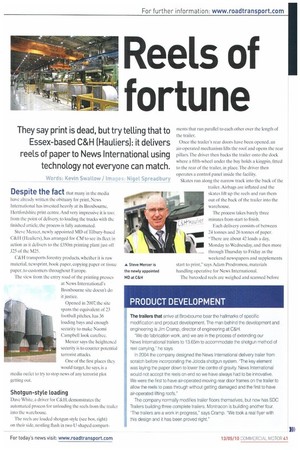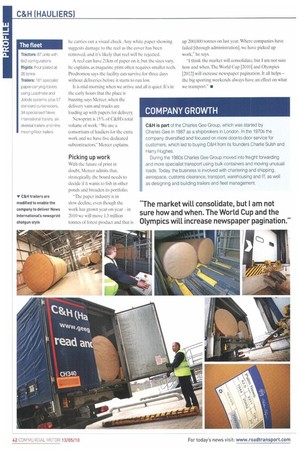Reels of fortune
Page 41

Page 42

If you've noticed an error in this article please click here to report it so we can fix it.
They say print is dead, but try telling that to Essex-based C&H (Hauliers): it delivers reels of paper to News International using technology not everyone can match.
Words: Kevin Swattow / Images: Nigel Spreadbury Despite the fact that many in the media
have already written the obituary for print, News International has invested heavily at its Broxbourne, Hertfordshire print centre. And very impressive it is too: from the point of delivery, to loading the trucks with the finished article, the process is fully automated.
Steve Mercer, newly appointed MD of Tilbury-based C&H (I la uliers), has arranged for CM to see its fleet in action as it delivers to the £350m printing plant just off J25 of the M25.
C&H transports forestry products, whether it is raw material, newsprint, book paper, copying paper or tissue paper, to customers throughout Europe.
The view from the entry road of the printing presses at News International's Firoxbourne site doesn't do it justice.
Opened in 2007, the site spans the equivalent of 23 football pitches. has 36 loading bays and enough security to make Naomi Campbell look carefree.
Mercer says the heightened security is to counter potential terrorist attacks.
One of the first places they would target, he says, is a media outlet to try to stop news of any terrorist plot getting out.
Shotgun-style Loading
Dave White, a driver for demonstrates the automated process for unloading the reels from the trailer into the warehouse.
The reels are loaded shotgun-style (see box, right) on their side, nestling flush in two U-shaped compart merits that run parallel to each other over the length of the trailer.
Once the trailer's rear doors have been opened. an air-operated mechanism lifts the roof and opens the rear pillars. The driver then backs the trailer onto the dock where a fifth-wheel under the bay holds a kingpin, fitted to the rear of the trailer, in place,The driver then operates a control panel inside the facility.
Skates run along the narrow track into the back of the trailer. Airbags are inflated and the skates lift up the reels and run them out of the hack of the trailer into the warehouse.
The process takes barely three minutes from start to finish.
Each delivery consists of between 24 tonnes and 26 tonnes of paper. "There are about 42 loads a day, Monday to Wednesday, and then more through Thursday to Friday as the weekend newspapers and supplements start to print," says Adam Prodromou, materials handling operative for News International.
The bareoded reels are weighed and scanned before hc carries out a visual check. Any white paper showing suggests damage to the reel as the cover has been removed, and it's likely that reel will he rejected.
A reel can have 21km of paper on it, hut the sizes vary, he explains, as magazine print often requires smaller reels. Prodromou says the facility can survive for three days without deliveries before it starts to run low.
Newsprint is 15% of C&H's total volume of work. "We use a consortium of hauliers for the extra work and we have five dedicated subcontractors," Mercer explains.
Picking up work
With the future of print in doubt, Mercer admits that, strategically, the board needs to decide if it wants to fish in other ponds and broaden its portfolio.
"The paper industry is in slow decline, even though the work has grown year-on-year — in 2010 we will move 1.3 million tonnes of forest product and that is up 200,000 tonnes on last year. Where companies have failed [through administration], we have picked up work," he says.
"I think the market will consolidate, but I am not sure how and when. The World Cup [2010] and Olympics [2012] will increase newspaper pagination. It all helps — the big sporting weekends always have an effect on what we transport." •
































































































































